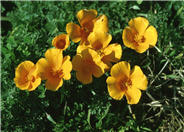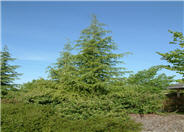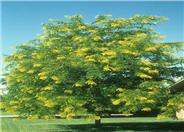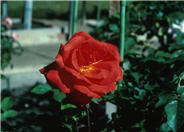
Common name:Oriental Fountain Grass
Botanical name:Pennisetum orientale
Oriental Fountain Grass is a clumping, warm-season grass with spectacular pinkish white flowers in summer and sometimes fall. Flower plumes change to light brown. Foliage is a bright green that changes to straw color as winter approaches. This grass is 1'-2.5' tall and wide. It usually does not reseed. This grass is striking if backlit to show off flower plumes.

Common name:California or Golden Poppy
Botanical name:Eschscholzia californica
This small annual (sometimes acts as a perennial) plant will grow to less than 1' tall and has light, small blue-green leaves with gold and orange flowers that bloom in spring and summer.

Common name:Mexican Feather Grass
Botanical name:Nassella tenuissima
The Mexican Fan Grass is a fine, airy grass that is emerald green in color. It has many soft yellow-beige flower stalks in the spring.It is extremely invasive; the California Invasive Plant Council is working to halt commercial sale of this grass because it is taking over natural areas. This grass grows 10"-12" tall , 1'-2' wide, and is drought tolerant.

Common name:Orange or Brown Sedge
Botanical name:Carex testacea
The testacea variety is an evergreen perennial that reaches 2' tall bearing very narrow, coppery brown leaves splitting to hair-like threads at their tips, and continuing to grow to 4-8' in length. This plant should be grown in sun with little or no summer watering. During winter, foliage turns orange. If this grass is planted in shade, foliage stays green. Flowers are insignificant. Orange Sedge looks great in containers or spilling over near walkways or into water features.

Common name:Deodar Cedar
Botanical name:Cedrus deodara
This fast-growing, coniferous evergreen is capable of reaching a size of 80' high by 40' wide. Its needles are a light, silvery green color, 2" long. Flowers are inconspicuous. Barrel shaped cones appear in fall and winter. Branches are pendulous and spreadings. Plant in area that has ample room for growth.

Common name:Coast Redwood, Redwood
Botanical name:Sequoia sempervirens
This fast-growing, aromatic tree has soft, dark green foliage with long needles appearing in flat sprays and brown, barrel-shaped cones that appear after 1 year. Its soft, red-brown bark is fiberous and furrowed. Particularly after mechanical damage, this tree will stump sprout to form new, young trees around the stump. Avoid planting in areas of high foot traffic. Inadequate moisture or a hot, dry site will inhibit its growth.

Common name:Sunburst Honey Locust
Botanical name:Gleditsia triacanthos inermis 'Sunburst'
This beautiful deciduous tree has tiny, yellow leaflets in spring, changing to lime green in summer, then golden in fall. It has an oval and pyramidal shape reaching 40' tall and 30' wide. Flowers are considered insignificant. This tree is used in urban areas as it tolerates heat, smog, drought, occasional flooding and saline soils.

Common name:Rose selected cultivars
Botanical name:Rosa species
These shrubs and vines are the most-loved in the West and are very resilient. They come in a wide variety of sizes and colors and are easy to maintain with proper care. Roses can be espaliered or used on a trellis or as shrubs along walkways. Some are fragrant; most have thorns.
| Designer: Jody Palmer | Perennial Border |
Photographer: GardenSoft |
Soils and Compost:
Incorporate compost 6" into your soil to retain water, reduce compaction, feed earthworms, and provide valuable nutrients to your plants.
Water Saving Tip:
Check the soil's moisture level before watering.
You can reduce your water use 20-50% by regularly checking the soil before watering.
Integrated Pest Management:
Remove irrigation water and fertilizer from areas where you don't want weeds to grow.
